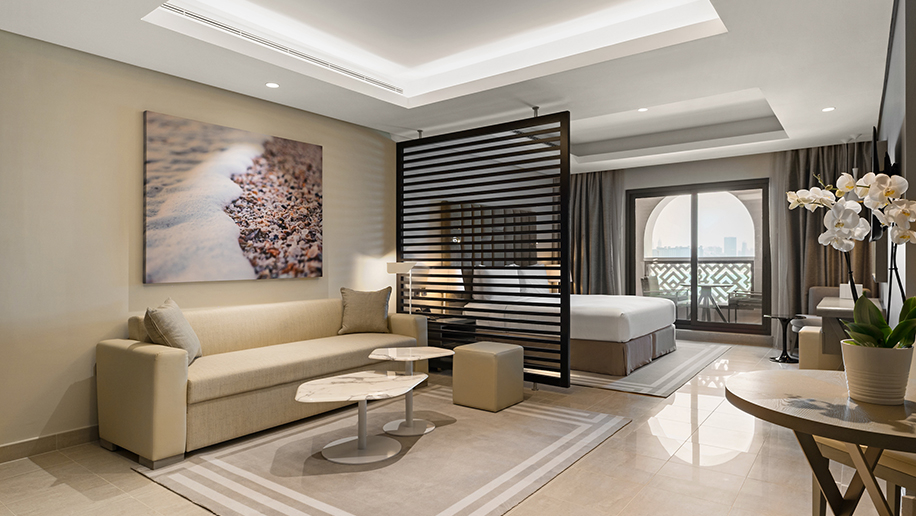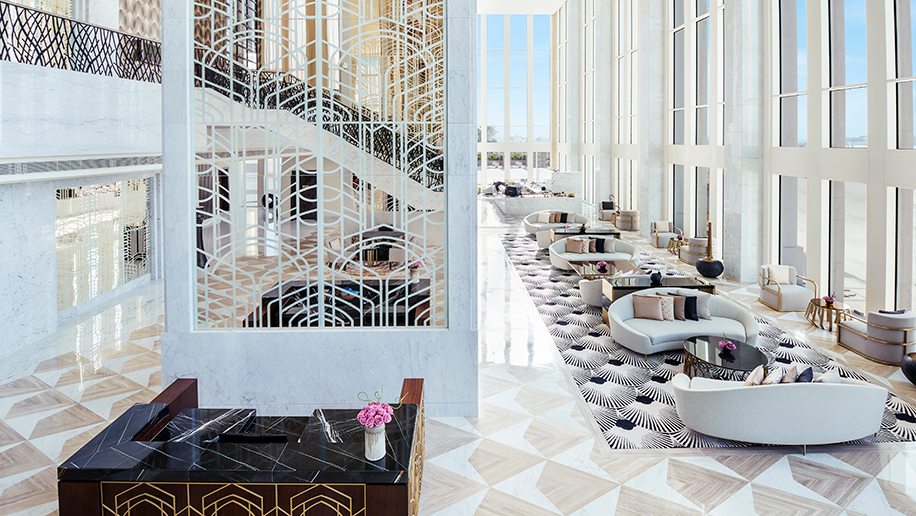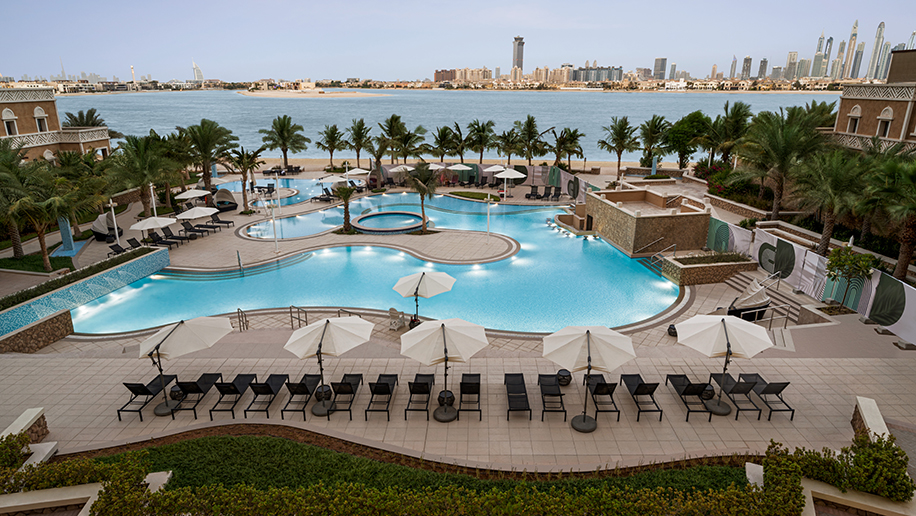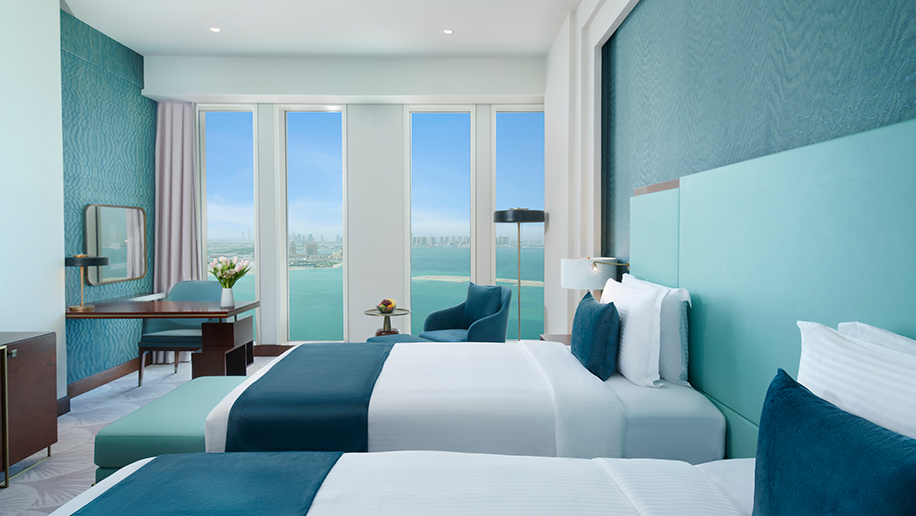
I’m Greek, and I think the Greeks said it first: ‘A story is not a story unless it gets told,’ ” quips the energetic Dimitris Manikis (pictured above), president of Europe, Middle East, Eurasia and Africa at Wyndham Hotels and Resorts. Wyndham is touted to be the world’s largest hotel franchising company by the number of properties – it has over 9,1000 hotels and 800,000 rooms spread across more than 95 countries – which means that Manikis doesn’t have to resort to hyperbole when narrating the story of Wyndham’s scale. Sticking to the facts makes for a compelling enough narrative in itself. “We currently have 67 hotels, and around 12,000 keys operating across 11 brands in the Middle East and Africa (MEA) region. We continue to bring diverse accommodation options to the region, with more openings under the Howard Johnson and Ramada brands, as well as the La Quinta and Days Inn by Wyndham brands, the latter two being launched in the market for the first time in 2021.”
As Manikis explains, last year was a largely successful one for the region’s travel industry with mega events such as Expo 2020, the football World Cup in Qatar and the Abu Dhabi Grand Prix, among scores of others, helping to drive inbound travel to the region by 4 per cent. “Mirroring the region’s success, these opportunities also gave us a chance to expand our room offering by 4 per cent during Q3,” he says.
The key markets in the region where Wyndham’s growth has been prominent include the UAE, Qatar and Saudi Arabia.
In the UAE, Wyndham opened its 102-key Wyndham Residences The Palm which offers laundry facilities, fully-equipped kitchens and connecting room options signalling the positioning of this property for long stays and one that appeals to families. The property has private beach access and two restaurants as well. That opening took Wyndham’s portfolio in the UAE up to 22 hotels, 14 of which are in Dubai.
Just before to the start of the World Cup in Qatar in November, Wyndham opened its 278-key Grand Doha West Bay Beach hotel. The West Bay property takes its portfolio of operational hotels in Qatar up to three, with another two under development.
Saudi is a market that Manikis indicates has much potential. “As part of our expansion plans in Saudi Arabia, we opened Ramada by Wyndham Riyadh King Fahd Road, our 13th hotel in the country, in November 2022. This latest opening will help us to further expand in this high-potential market, where there is a significant need for high-quality midscale hotels,” notes Manikis. Contrary to most hoteliers who are pushing luxury developments in Saudi, Manikis says that there is a sizeable appetite lower down the price chain. “The midscale and budget hotels for Saudi are going to be the trend in the next couple of years. Everybody talks about luxury [hotels in Saudi], but the economy and midscale are going to be extremely important in the next phase of development for Saudi Arabia.”
Growing responsibly
For an operation the size of Wyndham’s that has several thousand properties worldwide, defining its ESG targets is no easy task. “We have used the UN Sustainable Development Goals as a guide to set our first-generation performance targets for 2025, with strong progress achieved so far. This includes the Wyndham Green sustainability programme, a five-level certification initiative designed to help hotels improve in areas such as energy efficiency, reduction of emissions, conservation of water, reduction of waste, and to also reduce their environmental footprint to protect their biodiversity,” says Manikis. Some of those 2025 targets outlined in Wyndham’s ESG report last year said that it aims to achieve usage of 100 per cent renewable energy at its owned properties, complete elimination of single-use plastics and a 15 per cent reduction in both water consumption per square foot and Scope 1/Scope 2 emissions.
“What is important to us, especially in the MENA region, is how do we make sustainability part of the daily conversation. A very important message to all our franchisees and our managed properties is that this is not going to be a sprint. This is a marathon. We have Wyndham Green as a brand standard for all the hotels that we bring into our business. [Sustainability] is not just nice-to-have cocktail conversation anymore, this is the future of our industry.”
But as big as Wyndham is, for the hospitality industry to have its sustainability agenda make a real difference, collaboration is necessary. “A truly sustainable hospitality industry cannot be achieved alone. We work closely with partners, such as the Sustainable Hospitality Alliance (SHA). As an active member of the SHA, Wyndham Hotels and Resorts is part of a group with a combined reach of over 35,000 properties and 5.5 million rooms, representing 30 per cent of the global hotel industry by room count,” notes Manikis.
Wyndham’s global expansion has partly been realised via strategic acquisitions. Last September, it acquired European hotel brand Vienna House for US$44 million. That acquisition resulted in the addition of around 40 mid and upscale Vienna House properties equating to over 6,000 rooms, to Wyndham’s portfolio. “Over the past 30 years, the Vienna House brand has built a highly-recognised name for travellers in many European countries. We look forward to introducing it to new markets in the coming years and the MENA region has a strong opportunity for us especially as midscale lifestyle brands continue to grow in popularity,” observes Manikis. In November last year, Wyndham Hotels and Resorts unveiled the name of its 24th brand – Echo Suites Extended Stay by Wyndham, with Echo being an abridged version of ‘Economy Hotel Opportunity’. At the time of the unveiling in November, Wyndham said that Echo had become the group’s fastest-growing development pipeline brand with 120 hotels under development.
The road ahead
With a portfolio of properties spread across 95 countries, challenges faced by Wyndham in one region can be dramatically different from what it faces in properties at the other end of the world. But there are universal issues such as a squeeze on discretionary spending due to rising living costs that would put pressure across its global properties. “The reduction in non-essential spending is the direct result of a financial crunch. This is understandably concerning for our industry, as decreased tourism is a frequent consequence of financial instability. We already possess the insight to anticipate what will happen. Now, what matters is how we adapt to the situation and respond.”
One of the ways that Manikis suggests adapting and responding to the situation is by summarily dismissing five-year plans and instead choosing an agile model. “It is important to have the outline of growth – what we want to do, where we want to grow – and to then be very agile. Over the last two-three years we have learnt that agility, speed, and the ability to read the terrain and what is happening around you are going to be critical to growing your business and will make or break the future of the company,” he says.
As for trends emerging within the hospitality industry, he says that while bleisure is something that the industry must address, business travel will return strongly. In 2021, Wyndham debuted The Meetings Collection as part of the Wyndham Business programme. The Meetings Collection is a network of meetings-focused hotels that offer coordinators incentives through multi-year bookings. In the Middle East, the properties which are part of the programme include Wyndham Grand Istanbul Kalamis Marina and Wyndham Dubai Deira in the UAE. “Leisure is definitely the first to rebound. But business is going to come back. People still need to connect not in the way they did in the past, but business travel will still come back. Companies will still need to bring their employees together. Also, you cannot stay working from home for the rest of your life,” states Manikis.
He reveals that over the next three years, Wyndham plans to bring 25 additional hotels and around 4,000 rooms to the MEA region, adding to its current portfolio of 67 properties. Wyndham’s range of properties spans economy, budget, midscale, upperscale, soft brands, and all-inclusive. “The good news about the Middle East is that there’s room for all those brands and for every type of traveller.” True story.
















